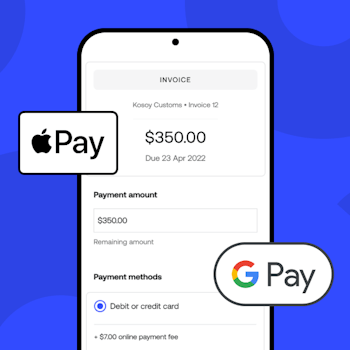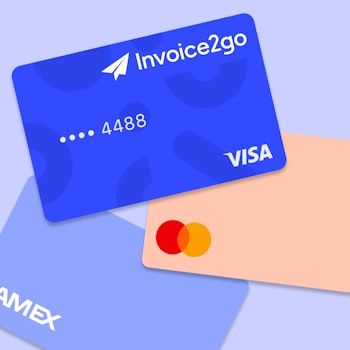
How to file taxes for the first time - the ultimate guide for small businesses
If you’ve jumped through the many hoops required to launch a new small business or become self-employed, chances are that you’re a meticulous self-starter. Even so, you may find the prospect of filing business taxes to be daunting.
You know you can’t afford to phone it in when it comes to your small business tax filing – small errors could spell disaster if an audit occurs. Also, missing out on tax deductions that you’re owed is like flushing money down the drain.
Whether you’re used to filing your personal taxes alone, or you typically turn over a shoebox of receipts to your CPA, you need to get organized and possibly hire some help to ensure that your business taxes are accurate and complete for your first filing – along with each one after that.
At Invoice2go, a Bill.com company, we’re always looking for ways to support self-employment and empower small business owners with innovative tools and expert advice that’s designed to minimize stress and drive success. When it comes to tax season and learning how to file small business taxes, several steps will put you on the right track.
If you’re nervously wondering, What do I need to file my taxes?, there are several points to be aware of, along with specific items you’ll need to collect to file small business taxes for the first time.
Why your business structure matters for filing taxes
The structure of your business significantly impacts how you file your taxes. If you started as a sole proprietorship, the good news is that you’re in the best position to change your business structure if another works better for your needs.
You could also choose:
- Partnership: For a business with two or more owners
- Limited Liability Corporation (LLC): Corporate protections at less expense
- S-Corporation: Incorporated with up to 100 shareholders, taxed as a partnership
- C-Corporation: Owners/shareholders taxed separately from the corporation
- Cooperative: A business owned/operated by its customers, run by a board
An important consideration when choosing a structure is who will be taxed and what that liability implies. As a sole proprietor, you are the business. You get all of the profits and enjoy the lowest tax rate – but you are responsible for all debts and taxes. In a partnership, you split the liability.
With an LLC, each owner files for their portion of the business on their personal tax return. Some states have additional requirements, so it’s wise to understand how your state operates from the get-go. S-corps are taxed like sole proprietorships or partnerships.
C-corps are taxed as a corporation, responsible for federal, state, and perhaps local taxes. You’ll file both individual and corporate taxes with this structure. Cooperatives share profits among members, who are responsible for listing cooperative gains on their personal income taxes.
When you’re learning how to file small business taxes, the structure you choose informs when and how you file. Different structures require different tax forms and may have different deadlines. You might file one tax return or split individual and corporate tax filings.
Take time to fully understand your taxpayer rights as well as the tax advantages, liabilities, and filing requirements involved before deciding on the best structure for you.
Do you need to hire help?
If you have a strong background in accounting, you may be in a better position than the average person to file business taxes. The IRS also has a small business tax workshop to help you learn the ropes.
However, if taking a tax workshop or doing it all yourself doesn’t sound right for you, you can outsource your business taxes to a skilled professional tax preparer (which, by the way, is a business expense you can write off).
Struggling with the question of “What do I need to file my business taxes?” becomes a moot point when you have a trusted CPA to manage the details on your behalf.
With that being said, finding the right accountant is crucial. This person will be responsible for:
- Minimizing tax liability and helping you to maximize profit
- Finding every deduction you’re due
- Staying up-to-date with changes to the tax code for your benefit
- Making sure that you file on time
- Managing audits
You need to look for a CPA experienced in working with your specific type of business structure and size. Then, discuss specifics of what you expect, from bookkeeping to external audits to tax filing services.

What tax documents you need to file your tax return
Learning how to file small business taxes can entail a steep learning curve, especially when collecting necessary documents and filling out required tax documents. Regardless of your business type, you’ll want to save documents related to all business income and expenses to file your tax return.
This starts with collecting copies of financial business reports for the tax year, including your income (profit/loss) statement, balance sheet, and cash flow statement. You’ll need to provide documentation (like receipts) related to assets, documents accounting for expenses, loan information (including accrued interest), and any other deductible expenses (like a home office space, travel expenses, etc.).
If you have employees, collect payroll data for payroll taxes. Don’t forget to provide any information on stocks and bonds purchased, held, or sold by the business. Since this is your first time filing small business taxes, you obviously won’t need to provide tax returns from the previous year, but this will be necessary in years to come.
You also need to know which tax forms to file. As a sole proprietor or member of a partnership, you’ll use Schedule C and 1040 forms. If you have a single-member LLC, you’ll file a Schedule C form and possibly form 8832, if you’re eligible. Multi-member LLCs will use a 1065 form and a Schedule K-1 form on personal tax returns.
An S-Corp will use form 1120-S (filing as a C-Corp, but qualifying for S-Corp status), while shareholders file form 2553. A C-Corp will use form 1120 or 1120-A. Members of cooperatives use forms 1099-PATR and 3491 Consumer Cooperative Exemption Application.
How to do basic small business tax calculations
You might get so lost in collecting documents that you forget about the impending bill coming due.
How can you estimate how much you owe in taxes so you can prepare? You’ll start by calculating your net income for the year (remaining profit after applicable expenses have been deducted from annual revenue). If you’re in some kind of partnership, you’ll also need to determine what percentage of the income is yours.
Next, you can compare your numbers to tax brackets released annually. If your business type requires personal income tax filing, you can use Federal Income Tax Brackets. If you’re filing separate corporate taxes for your business, look into Corporate Income Tax Brackets, for example.
You can also use tax calculators for your specific filing status and business structure (sole proprietorship, LLC, etc.). There are many free options available, but keep in mind that these are only estimates, and if you pay quarterly, it will obviously affect your final numbers.
Deductible business expenses you need to know about
As a business owner, your costs cut into your profits and reduce your income. Whether you’re buying a box of staples, a laptop and a smartphone, a company car, or some major manufacturing equipment, it’s not just the cost of doing business – it’s a deductible business expense!
While your CPA can do a lot to help you find tax deductions, learning how to file small business taxes to your best advantage requires a proactive approach. Nobody knows your business like you do, so you have the best opportunity to find every possible deduction to reduce your tax liability.
Among the most common business deductions are items like:
- Employee salaries and benefits
- Contract/freelance labor
- Business insurance
- Equipment (purchase, rental, or lease)
- Office supplies
- Home office
- Business meals/entertainment
- Business travel
- Professional services (like your CPA, lawyers, etc.)
- Education/training
- Renovations or moving expenses
- Bank charges
- Interest on loans
- Losses
As a new business, you may also be able to claim startup expenses related to legal costs, recruitment, marketing, and more that went toward launching your business.
It’s important to understand that some items you can only claim as partial expenses, like meals and entertainment, while others, like equipment purchases, you can claim in full. Your CPA can help you to determine the value of each deduction when you provide the details.
Due dates for filing your small business tax return
Figuring out what you need to file your taxes is undeniably complex, but one of the most crucial things to know is your deadline. It doesn’t matter how many documents you collect or how organized and accurate your filing is – if you miss your filing deadline, there will be penalties.
Of course, you can always file an extension if you simply can’t meet the deadline. This will still entail paying interest on anything you end up owing, but at least you’ll avoid other failure-to-file penalties.
So what’s the deadline for your state and federal income tax return? Some businesses, like sole proprietorships, share a tax filing deadline with individuals filing income tax returns: April 18. If you have an S-Corp, on the other hand, you’ll need to file a full month earlier on March 15.
Filing an application for extension of your taxes
The best-laid plans of mice and men often go awry, and when it comes to learning how to file small business taxes for the first time, you might find yourself elbow-deep in a mess of receipts with a filing deadline fast approaching. There’s no need to stress – you can simply file an extension.
While this isn’t something that you should get into a habit of doing, as it will result in interest accruing on anything you owe, it can give you the time you need to get everything in order and ensure a complete and accurate filing, which is incredibly important if you ever get audited.
2021 was a challenging year for businesses, and if you were one of the many that received stimulus assistance, chances are that you’ll need a little more time to get your ducks in a row.
How can you file for an extension? Your CPA can do it for you, or you can e-file form 7004 to request an automatic six-month extension.
Paying estimated taxes
Businesses can proactively reduce tax liability (or at least avoid owing a huge chunk for the year) by filing estimated quarterly tax deposits. Think of it like an employee withholding taxes from every paycheck to reduce what they owe when they file their personal income tax for the year.
The question, of course, is how much you should pay in estimated taxes and whether it’s worth spending the time on. If you expect to owe more than $1,000 in annual taxes as a sole proprietor or partner, you might want to consider filing estimated taxes ahead of time. Corporations typically file estimated quarterly taxes if they expect to owe more than $500 for the year.
As for how much to pay for your estimated taxes, it can vary widely by business and tax year. You don’t want to pay too much and impede your cash flow or pay too little and end up owing a lot for your annual filing. It’s called an estimate for a reason, but by calculating your anticipated adjusted gross income, taxable income, and known deductions, you can at least get in the ballpark. Visit the IRS website to learn more.
How to take the stress out of filing your small business taxes the first time
The best defense is a good offense. When it comes to learning how to file your taxes as a small business, self-employed professional, or independent contractor, this means having the tools in place to collect necessary documents, track income and expenses, and generate reports instead of having to sift through a year’s worth of data piecemeal.
Whether you use DIY tax preparation programs and do your own taxes or rely on a tax professional, you can stay organized and save time and money with Invoice2go. With invoice tracking, reporting, and so much more, you’ll not only have the tools you need to manage your cash flow throughout the year, but you’ll also gain easy access to necessary data when it comes time to pay taxes.
Related Articles

How to accept credit card payments on Invoice2go in 3 simple steps

Accept payments online via Apple Pay and Google Pay

Must-not-miss write-offs as you wrap up 2022 year-end finances

5 ways accepting credit and debit card payments helps your business stay resilient

4 easy ways to increase cash flow today

What is Small Business Saturday and why is it important?
The features and surprising benefits of a well-designed packing slip
